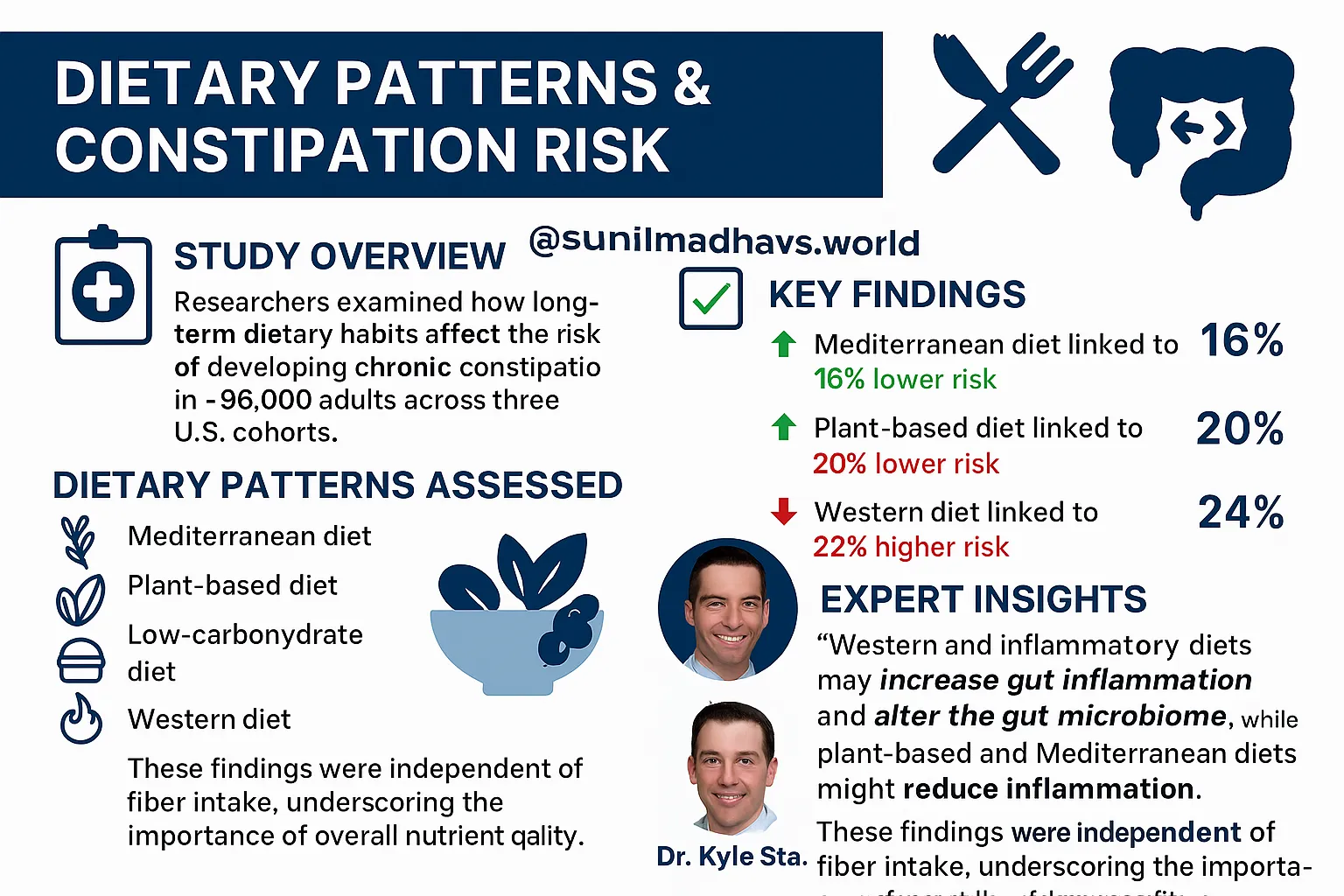Mediterranean and Plant-Based Diets Linked to Lower Risk of Chronic Constipation
A recent study published in Gastroenterology suggests that long-term adherence to Mediterranean and plant-based diets is significantly associated with a reduced risk of developing chronic constipation. In contrast, individuals who follow Western-style or inflammatory diets may face a greater risk of experiencing this condition.
According to Dr. Kyle Staller, director of the Gastrointestinal Motility Laboratory at Massachusetts General Hospital and associate professor of medicine at Harvard Medical School, most current dietary advice focuses on managing constipation once it occurs — typically by increasing fiber intake. However, this study shifts focus by examining how different long-term dietary habits may prevent constipation from developing in the first place.
Study Design and Data Sources
The research team analyzed data from three large, long-term population-based studies:
- Nurses’ Health Study
- Nurses’ Health Study II
- Health Professional Follow-up Study
These studies collectively tracked nearly 96,000 middle-aged and older adults with average participant ages ranging from 60.5 to 78.6 years. Dietary habits were assessed using validated food frequency questionnaires completed every four years.
Participants’ diets were categorized into five major patterns:
- Alternate Mediterranean Diet
- Plant-Based Diet
- Low-Carbohydrate Diet
- Western Diet
- Inflammatory Diet
The researchers also collected self-reported data on symptoms of chronic constipation, such as infrequent bowel movements, hard or lumpy stools, and excessive straining lasting at least 12 weeks in the past year. Cases of constipation-predominant irritable bowel syndrome (IBS-C) were also identified when abdominal pain accompanied bowel symptoms.

Findings and Risk Associations
During a 2 to 4-year follow-up period, 7,519 new cases of constipation were recorded.
Key findings include:
- 16% lower risk of constipation among individuals adhering to a Mediterranean diet
- 20% lower risk for those following a plant-based diet
- 24% increased risk associated with an inflammatory diet
- 22% increased risk linked to a Western diet
Dr. Staller emphasized that these protective effects from healthy diets appear to be independent of fiber intake. This suggests that other components of the Mediterranean and plant-based diets — possibly related to how they affect the gut microbiome — play a role in promoting regular bowel habits.
Clinical Implications and Lifestyle Impact
Dr. Staller believes these findings are meaningful because they highlight the potential of preventing constipation through dietary patterns, not just managing symptoms once they arise. He also stressed that relying on a specific food or supplement may be less effective than making overall changes to diet quality.
The Mediterranean diet, known for its cardiovascular benefits, may now also be considered a viable strategy for maintaining digestive health, thanks to its rich composition of fruits, vegetables, and nutrient-dense foods.
Staller noted, “Rather than waiting until someone has chronic constipation and then recommending fiber or medication, we can encourage preventive dietary changes that have multiple health benefits beyond bowel regularity.”
Further Details and Disclosures
- Contact: Dr. Kyle Staller can be reached at kstaller@mgh.harvard.edu for more information.
- Disclosures: Dr. Staller reported receiving research support and consulting fees from companies including Ardelyx, Gemelli Biotech, Mahana, ReStasis, Salix, and Takeda. Full disclosures for all authors are available in the published article.


